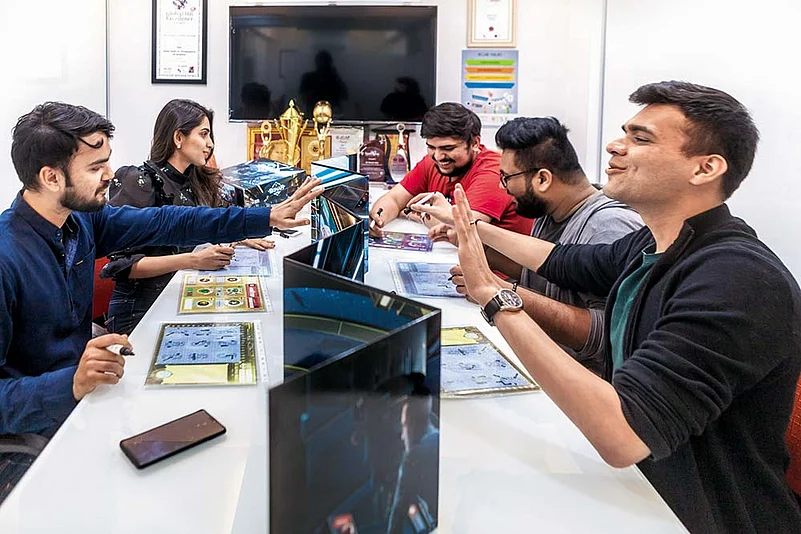Imagine an 11-year-old during the afternoon of a hot summer holiday, circa 1985. Very probably, he would have been hunched over a board game with siblings or friends. Eyes transfixed, heads still, their hands alive and busy with die and the pieces of play. It could have been the simple pleasures of ludo/snake & ladder, the more involved business of Monopoly, the strategic fields of table cricket/football, the cerebral chess or scrabble…. Videogames were making a slow ingress, but happily co-existed as an occasional diversion. Things changed from the advent of the home computer, with its many playful diversions; the stealthy march of the digital age was upon us with its flash and dazzle. The story of the next decade-and-a-half is the story of the digitalisation of young lives. The playthings of the preceding generation lay mouldering in forgotten cupboards. The gaming console had banished the board game.
But we had underestimated its pertinacity. Tabletop games made of cardboard and wooden pieces are clawing back into relevance, seducing youngsters away from Candy Crush and other smartphone distractions. The positives are the obvious ones—taken for granted once, but one that has assumed importance when every man is a digital island: Board games are great for social interaction, for actual communication with people. Many games also help refine concentration, memory, planning and problem-solving. So much so that they are being used in academia. S.K. Mahapatra, director, Jaipuria School of Business, says, “Management institutes use these games to help the students sharpen their thinking and executing abilities. Though there is an element of chance, most of these games are based on pure strategy.”
Husband-wife duo Jill Rambhia Veera and Krunal Veera left high paying corporate jobs to follow their passion for board games. They started the Board Game Co., which works on three verticals: corporate (employee engagement and training), Emerge (for kids) and social engagement. A great votary of next-gen modern games, Rambhia mentions that Emerge, the learning programme for children (8-15 years) through board games, helps build cognitive thinking and social skills through experiential learning therapy. Another programme, called Engage, is a platform that gets like-minded people together for companionship, even marriage.

Clinical psychologist Seema Hingorrany says, “The character of a person is revealed by his behavioural pattern that is displayed during the game, in how he /she reacts to winning or losing.”
The oldest virtue of board games—creating bonding among family members—is considered to be extremely therapeutic. Mumbai-based psychologist Padma Rewari echoes, “I come across cases where the family is disturbed or does not spend quality time…the first suggestion is to get a carrom board or a chess set. Clients confess how games had brought about a change in the family atmosphere.” Hingorrany has observed that children who play board games have a better relationship as adults with their parents and grandparents.
Games can also solve anger issues and impulsive behaviour. Life skills like tolerance and team building are learnt through board games. Scrabble—that ancient mainstay—for instance, helps build vocabulary.
As the Veeras heartily iterate, board games are a tool for employee engagement, learning and bonding. Some of its champions claim that one can know more about the opponent in an hour of play than through a year of conversation. Board games have become a key learning tool both in offices and classrooms. “Our sessions are designed to aid desired learnings. Rather than just theoretical learning of the concept, an individual experiences the learning, ensuring that it sticks with him,” adds Rambhia.
Games are no longer looked upon as a waste of time, as B-schools wake up to the pedagogical uses of board games. Says Tarun Anand of the Universal Business School, Karjat, “We encourage simulation board games in our college like Markstrat, Opstrat and the Sandwich game, which enable students to make marketing/operational/strategic decisions in a dynamic environment.”
While Markstrat is a marketing strategy simulation game, where students need to make decisions regarding the marketing mix of 7Ps (product, price, promotion, place, packaging, positioning and people),
Opstrat is an Operations Strategy simulation, where students make decisions on operational variables on the factory floor to get optimum levels of production to meet quality parameters. In the Sandwich game, students are given a budget to buy raw materials for sandwiches, determine the product mix and production processes, examine bottlenecks, determine quality and make profits.
Now that the fun is flowing back, board game parties are becoming a huge craze among youngsters. Rambhia feels that even at cosy parties, people are found glued to their mobile phones, but a board game party changes all that—adrenalin flows, conversation soars, bonds are created instantly.

Children playing at Seventh Sense, Mumbai .
As Rewari and Hingorrany concurred, the role of games in encouraging inter-generational communication and strengthening family relationships cannot be overrated. Susmitha Subbaraju of Carrot restaurant, Bangalore, says, “Whenever we go on family trips with our cousins, aunts, uncles and parents we like to play board games. Our favourites being Pictionary, Monopoly and Taboo…. The best part of these gaming sessions is we end up creating joyful, fun memories.”
In this age of online collectives, it’s but natural that as board games build up a cult, their lovers would get together. Bangalore-based Awathy Menon started the board game community called Victory Point with his friends to promote experimental learning. Board games are unique in that it is socially interactive and immersive at the same time. Says Menon, “Board gaming fosters competitive spirit, along with a diversity of concepts and themes that aid analysis and decision making.”

Where others see personality benefits, entrepreneurs sniff out ways for profit. Board game cafes are a new thing in the metropolises. Pair A Dice Cafe in Mumbai has 250 international premium board games and waiters even help customers out with them. Customers have to pay for some games, but the regular ones like Jenga and Ludo can be played for free. Nayan and Sheetal Shah, MDs at Drifters Tap Station, a brewery in Mumbai, say, “Our venue is about travel and board games work with both travel and beer. To add to the experience we added elements like board games and a beer pong table.” The games last from a couple of minutes to several hours, leading to guests staying longer and trying out food and other drinks.
Moreover, the burgeoning community of board gamers have benefited from the many employees who live alone, often away from their hometowns and have the time for new friends and games. Lounges which are stacking up on board games to offer a ‘feel at home’ experience have them in mind. One can’t bring back those idle, sepia-touched afternoons from the past, but one can pluck out the board games from them, things that so infused those days with charm, fit them into our swirling, motionary modern lives and spread them across the board.


























